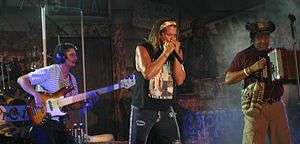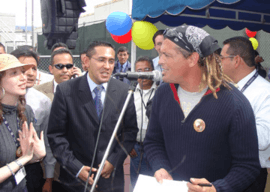Carlos Vives
| Carlos Vives | |
|---|---|
|
Carlos Vives at the World Economic Forum. | |
| Background information | |
| Born |
7 August 1961 Santa Marta, Colombia |
| Genres | Vallenato, cumbia, porro, champeta, rock, pop latino, bambuco, dance-pop |
| Occupation(s) | Recording artist, composer and actor |
| Years active | 1978–present |
| Labels |
FM Discos Y Cintas (1986) Sony Music (1987–1992) / (2013–present) Sonolux / Gaira Música Local (Colombia) (1993–2004) Polygram (1993–1996) EMI/Virgin Records (1997–2011) |
| Associated acts |
Rafael Escalona Juanes Hora Local Aterciopelados Bloque de Búsqueda (banda) Sidestepper Michel Teló Ricardo Arjona Shakira |
| Website |
carlosvives |
Carlos Alberto Vives Restrepo (born 7 August 1961) is a Colombian singer, composer and actor.
Biography
Carlos Vives was born on 7 August 1961[1] in Santa Marta, Magdalena, Colombia, where he spent his first 12 years of life. At that age, he and his family moved to Bogotá in search of a better life. They lived with Diego Martínez and his family. He enrolled in Jorge Tadeo Lozano University and holds a publicist degree from the university. In Bogotá, he also acquired a taste for rock, getting involved in the local music scene, and started playing in bars and cafés around the city.
1982–1989
In 1982, Vives began acting in a number of shows and telenovelas including "Pequeños Gigantes" (Little Giants – 1983) and "Tuyo es Mi Corazón" (Yours is My Heart – 1985). He finally found fame in 1986 by playing the title role of Gallito Ramírez, which told the story of a Colombian Caribbean coast boxer who falls in love with an uptight girl, who was portrayed by his first wife, Margarita Rosa de Francisco. That same year, he released his first album, Por Fuera y Por Dentro. The album, primarily made of ballads, failed to gain any success. In 1987, he released his second ballad album, No Podrás Escapar de Mí. Though the title track reached No. 30 on the Billboard Hot Latin Tracks, the album did not sell well. His next album, Al Centro de la Ciudad, would become his last album to feature synthesizer-romantic ballads. Some of the songs got some attention being featured in telenovelas, but the album, just as its predecessors, failed to gain success.
In 1989, he was offered an acting job in Puerto Rico, and upon moving, he took a break in his music career. He is remembered for his leading roles in the soaps La Otra and Aventurera.[1] He married Herlinda Gómez,[1] his second wife (they have since divorced). Vives would spend his time between Colombia, Miami and the city of Mayagüez, Herlinda's hometown, during his marriage to her.
Since 1991

Upon his return to Colombia in 1991, he was offered a TV role that would change his life forever. He was cast in the leading role of a fantasy series based in the life of vallenato composer Rafael Escalona called, not surprisingly, Escalona.[1] He sang the composer's songs in the series, and that's when he retooled his career towards vallenato,[2] gaining national success with the release of the Telenovela's two soundtrack albums, Escalona: Un Canto a la Vida and Escalona: Vol. 2.
In 1993, backed by the band "La Provincia", Vives released the album Clásicos de la Provincia in which he started fusing Vallenato with rock,[1] pop and other Caribbean Colombian ethnic rhythms. This fusion scandalized Vallenato purists. This style of vallenato was a huge success not only in Colombia but all over Latin countries, and the albums' lead single, La Gota Fría, became a hit all over Latin America. Clásicos de la Provincia, won the Billboard Latin Music Awards Best Album and would become a timeless classic in Colombian and Latin American music, introducing Vallenato to both Colombia and the rest of the world.
The follow-up album, La Tierra del Olvido would mark a further step in Vives' desire to fusion rock, funk and pop music with traditional Colombian genres. The album gave Vives classic hits such as the title track, and the up-tempo opening track Pa' Mayte.
His subsequent releases, Tengo Fé (1997), El Amor de Mi Tierra (1999), Déjame Entrar (2001) and El Rock de Mi Pueblo (2004), were all commercially successful and were well received by the critics. In 2002 Carlos Vives' album "Déjame Entrar" won him his first Grammy award for Best Traditional Tropical Latin Album.
In 2009 he released the album Clásicos de la Provincia II, which was sold exclusively in Colombian supermarket chain "Almacenes Éxito." The album saw Vives' return to covering famous Vallenato songs in his own style. It sold massively and the single Las Mujeres received wide radio airplay in all Colombia.
His hits include "Matilde Lina", "La Hamaca Grande", "La gota fría", "Alicia Adorada", "Pa' Mayte", "La Tierra del Olvido", "Tu Amor Eterno", "Fruta Fresca", "Déjame Entrar", "Luna Nueva", "Carito", "Papadio", "Como Tú" and "Décimas Del Parecido" (this last one a tribute to Guillermo Martínez, a Cuban-born radio host who resides in Mayagüez, and for whose program Vives was an occasional master control technician).
Current
In 2012 Carlos Vives began a new era in television and music.
With more than 40 songs written in that year, the new album was released in April 2013 and featured 11 tracks. The first single, "Volví a Nacer", was released in September 2012 and went straight to No. 1 on Billboard. The second single, "Como Le Gusta a Tu Cuerpo" featuring Michel Teló was released in late January 2013. Carlos also graced the small screen for all Colombia to see when he joined fellow artists Ricardo Montaner, Fanny Lu, and Andrés Cepeda as one of the coaches for the first season of the vocal competition series phenomenon The Voice Colombia, which premiered October 2012 via Colombian TV network Caracol TV.
On May 27, 2016, "La Bicicleta" featuring fellow Colombian singer Shakira was released as a single. The video for the song was filmed in Colombia in each of their home cities.[3] The song debuted at the number one spot on Billboard's US Latin Airplay chart and number four on the US Hot Latin Songs chart.
Personal life
Vives was married to the famous Colombian actress Margarita Rosa de Francisco in a relationship that was closely followed by the national media. Herlinda Gómez was his second wife with whom he had 2 children: Carlos Enrique Vives and Lucía Vives.[4] He's now married to former Miss Colombia Claudia Elena Vásquez and they have 2 children:[1] Elena Vives, and Pedro Vives. He spends his time between Miami and Colombia, mainly Santa Marta and Bogotá.[1]
Discography
- 1986 Por Fuera y Por Dentro
- 1987 No Podrás Escapar de Mí
- 1989 Al Centro de la Ciudad
- 1991 Escalona: Un Canto A La Vida
- 1992 Escalona: Vol. 2
- 1993 Clásicos de la Provincia
- 1994 20 De Colección
- 1995 La Tierra del Olvido
- 1997 Tengo Fe
- 1999 El Amor de Mi Tierra
- 2000 15 Exitos
- 2001 Déjame Entrar
- 2004 El Rock de Mi Pueblo
- 2009 Clásicos de la Provincia II
- 2013 Corazón Profundo
- 2014 Más + Corazón Profundo
- 2015 Más Corazón Profundo En Vivo De La Bahia De Santa Marta
Filmography
- 1982 Tiempo Sin Huella (Julián).
- 1982 David Copperfield (David Copperfield "Adult").
- 1983 Pequeños gigantes (Guineo).
- 1984 El Faraón (Capitolino Rojas).
- 1985 Tuyo es mi corazón (Carlos Sánchez).
- 1986 Gallito Ramírez (Javier "Gallito" Ramírez).
- 1987 Tormento (Carlos Augusto).
- 1988 La Otra (Arnaldo Vásquez).
- 1989 La Conciencia de Lucía (Alberto).
- 1989 LP loca pasión (Julio Sanmiguel "Sammy").
- 1990 Aventurera (Juan Carlos Santander).
- 1991 Escalona (Rafael Escalona).
- 1991 Cadena Braga (José Antonio).
- 1992 La mujer doble (Mateo Escondria).
- 1992–1993 La estrategia del caracol (José Antonio Samper Pupo).
- 1995 La Tele.
- 2012 La Voz Colombia (Coach).
Awards and nominations
Grammy Awards
The Grammy Award is an accolade by the National Academy of Recording Arts and Sciences of the United States to recognize outstanding achievement on the music industry. Carlso Vives has won two awards from four nominations.
| Year | Nominee/work | Award | Result |
|---|---|---|---|
| 2015 | Más + Corazón Profundo | Best Tropical Latin Album | Won |
| 2014 | Corazón Profundo | Best Tropical Latin Album | Nominated |
| 2005 | El Rock de Mi Pueblo | Best Latin Pop Album | Nominated |
| 2002 | Déjame Entrar | Best Traditional Tropical Latin Album | Won |
Latin Grammy Awards
A Latin Grammy Award is an accolade by the Latin Academy of Recording Arts & Sciences to recognize outstanding achievement in the music industry. Carlos Vives has won nine awards from twenty two nominations.
Premios Nuestra Tierra
A Premio Nuestra Tierra is an accolade that recognize outstanding achievement in the Colombian music industry. Carlos Vives has received four awards from eleven nominations.[5]
| Year | Nominee/work | Award | Result |
|---|---|---|---|
| 2014 | "La Foto de los Dos" | Best Song of the Year | Won |
| Himself | Best Artist of the Year | Won | |
| Corazón Profundo | Best Album of the Year | Won | |
| "Bailar Contigo" | Best Tropical Pop Performance of the Year | Nominated | |
| "Como Le Gusta a Tu Cuerpo" | Best Tropical Pop Performance of the Year | Nominated | |
| "La Foto de los Dos" | Best Tropical Pop Performance of the Year | Nominated | |
| Himself | Best Tropical Pop Artist of the Year | Won | |
| "La Foto de los Dos" | Best Music Video | Won | |
| Himself | Best Mainstream Artist | Nominated | |
| "La Foto de los Dos" | Best Mainstream Song | Nominated | |
| Himself | Tweeter of the Year | Nominated |
World Music Awards
The World Music Awards is an international awards show founded in 1989 that annually honors recording artists based on worldwide sales figures provided by the International Federation of the Phonographic Industry (IFPI).
| Year | Nominee/work | Award | Result |
|---|---|---|---|
| 2013 | Corazón Profundo | World's Best Album | Nominated |
| Carlos Vives | World's Best Male Artists | Nominated | |
| Carlos Vives | World's Best Live Act | Nominated | |
See also

- List of singer-songwriters/Colombia
- Pop Latino
- http://www.oocities.org/televisioncity/taping/2609/actor.html
- http://www.oocities.org/televisioncity/taping/2609/discos.html
- http://www.oocities.org/televisioncity/taping/2609/suvida.html
- http://www.reocities.com/carlosvivesamigas/letrasporfueraypordentro.html
References
- 1 2 3 4 5 6 7 biografías.es, .
- ↑ Vallenato.com, .
- ↑ "Shakira and Carlos Vives film new video for "La Bicicleta"". Latin Times. Retrieved May 23, 2016.
- ↑ lafiscalía.com.
- ↑ Premios Nuestra Tierra received to Carlos Vives:
- Nuestra Tierra 2014 nominees;"Nominados a los Premios Nuestra Tierra 2014" (in Spanish). La Mega. Retrieved 2014-12-01.
- Nuestra Tierra winners 2014:"Premios Nuestra Tierra 2014: lista de ganadores" (in Spanish). Retrieved 2014-12-01.
External links
| Wikimedia Commons has media related to Carlos Vives. |
- (Spanish) Official site
